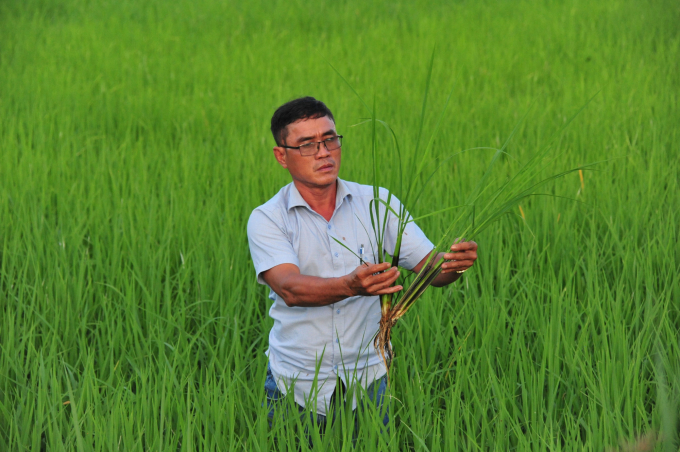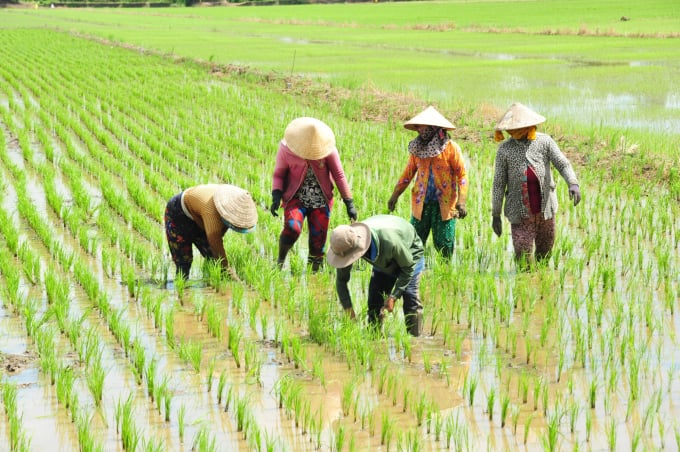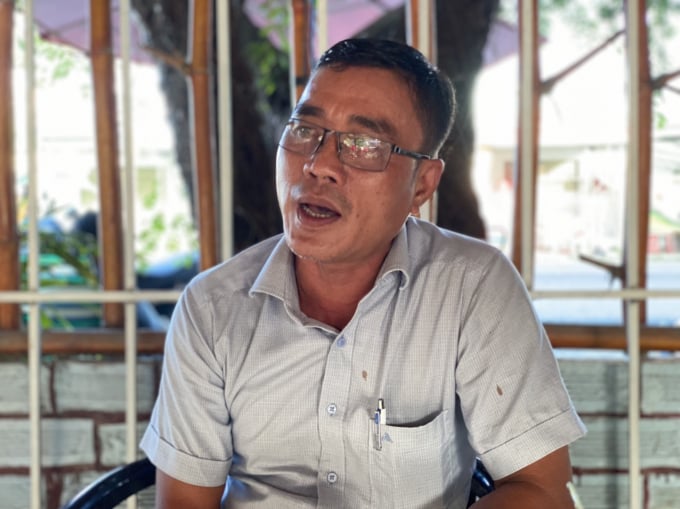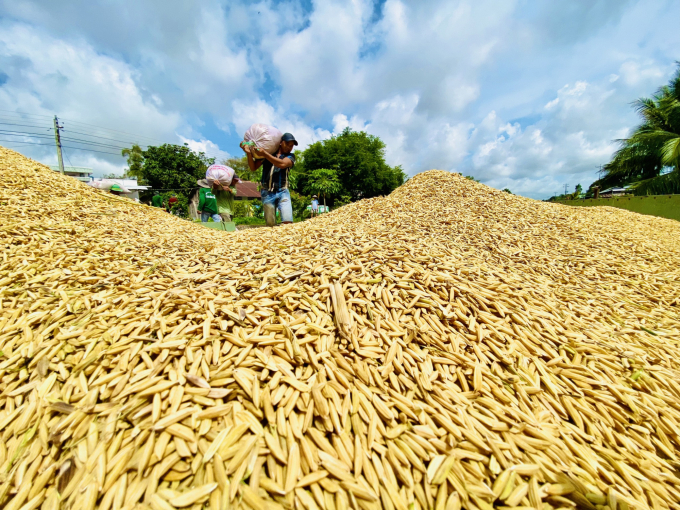May 16, 2025 | 10:09 GMT +7
May 16, 2025 | 10:09 GMT +7
Hotline: 0913.378.918
May 16, 2025 | 10:09 GMT +7
Hotline: 0913.378.918
According to Mr. Huynh Quoc Toan, Head of the Agriculture and Rural Development Office of Chau Thanh district, collective economy is one of the answers to farmers' age-old “good crop - bad price” problem from production organization, services to market connection stage.
Chau Thanh district has 21 agricultural cooperatives, 19,000 ha of double-crop rice. Grand paddy fields with 98% of which produce high-quality rice and cost-effective production models directly benefiting farmers are evident achievements.
Applying collective economy to expand the scale of agricultural cooperatives, it won’t be long for Chau Thanh to become an agricultural service center not only in Kien Giang but also in the whole Ca Mau peninsula. But Mr. Toan also said that achieving that goal requires further development in agricultural cooperatives. In this regard, Tan Hung Agricultural Cooperative is a prime example.

Mr. Le Minh Hai, Chairman of the Board of Directors and General Director of Tan Hung Agricultural Cooperative. Photo: Hoang Vu.
Body as hard as steel, mouth does the talk and hands do the work, just one look is enough to know that Chairman and General Director of Tan Hung Agricultural Cooperative Le Minh Hai is a fierce person. Many people believe that Tan Hung has become what it is today - a powerful agricultural cooperative in Chau Thanh, one of 14 new cooperative models in Kien Giang province, is also thanks to the fierceness of this man.
Giuc Tuong commune, where Tan Hung Agricultural Cooperative was established, was originally a community of many Khmer households for many generations. They lived scatteredly in groups along the interlaced canals.
Most of them had a spontaneous farming practice. They would farm when they wanted and stop when they wanted. They didn’t even care about the varieties they planted, the fertilizer they used, or the profit they might have. When it was time for the harvest, owners of harvesters relied on that reason to freely set the price. Traders who came would press the price to the lowest possible.
Tan Hung Agricultural Cooperative was born with the mission of eliminating old farming practices and mindset in Giuc Tuong, but the journey was nowhere easy.

Collective economy has changed the farming mindset and habits of people in Chau Thanh. Photo: Hoang Vu.
In the early days of establishment, the whole Tan Hung Cooperative had only 29 members with a meager capital of only VND 50 million. And the most difficult thing is not necessarily money. It was that the people did not show support. They were still used to the freedom and thus deemed the cooperative an unnecessary restrain. With that being the case, in order to have enough members according to regulations, the local authority must mobilize officials and employees of communes and districts to join the cooperative. Those who do not have a field or capital also enter. The situation of struggling prolonged for a few years until Mr. Le Minh Hai became the chairman.
It happened in 2011. Mr. Hai was originally a “pagan” of agriculture from Dong Thap, living in Rach Gia city. After his father died, he had to go back to Giuc Tuong to take care of the house and fields. Upon the invitation of his uncle - the cooperative manager, he joined and was later elected as the Chairman of Tan Hung Agricultural Cooperative.
When he first took over, the property left by his uncle was almost zero. Only five 15-horsepower electric motors to pump water, but three of them were already broken. He tried to persuade and mobilize the people of Giuc Tuong, but everyone still pump their own fields, and reap their own rice.
While studying the 2012 Draft Law on Cooperative Mr. Hai found many good things. It said that people must buy and sell together, and to be a cooperative meant to control input and output, have a production plan, and organize production clearly. “But with these damaged pumps, what do I control, how can I organize production?”
So the first goal of Mr. Hai was to convince the people to hand over the pumping stage to the cooperative. There was only 60 ha in the Tam Giac field, but the situation was already too intense.
He spoke, but no one listened, so Mr. Hai mobilized three other members of the board of directors to make a gamble. They took their family's red book and pawned it at a gas station with an interest rate of 2% per month to get money to buy machinery. “You have to show people that you have the power to make them believe.” The cooperative assured the farmers that it would serve them from the beginning to the end of the crop. If the cooperative could not do it, the whole board of directors will resign and take full responsibility before the people.

Tan Hung's solution: Do whatever is beneficial for the people. Photo: Hoang Vu.
A meeting was officially convened with a full board consisting of cooperative members, representatives of commune, hamlet and people. The minutes clearly stated the date, time, venue of the meeting, and how many people attended. The opinions of delegates were completely noted in detail, how many out of how many delegates raised their hands to agree, calculate the uniform rate for each content.
And the first crop organizing irrigation pump service was a success. As for the people, they then saw that joining a cooperative to pump irrigation in union was both leisure and cost saving up to VND 400,000/ha.
The solution Mr. Hai offered to continue mobilizing people was auctioning. Another meeting was held, promoting the spirit of democracy. All earthmoving machine owners are invited to participate in the bidding.
The meeting host set the starting price of land for 1 ha lower than the market price. From that starting price, owners joined the bidding. Everyone was full of love for the community, so whoever offered the lowest price and met the cooperative's land-working and harvesting schedule would be selected.
Thanks to that, there was no longer the situation of price squeezing or waiting for soil preparation, saving farmers’ effort. The cost was also approximately VND 300,000/ha cheaper than usual.
Then Mr. Hai had this thought: “If only people could produce seed and harvest together, they would save a lot more money. And the cooperative is more than capable of making it a reality.”
Receiving support from the higher authority with a combine harvester, the cooperative bought another one to open the harvesting service and built a team to produce rice seeds in service of the people. This time the plan went through without a problem, and the effect was clear. Taking an active stance in terms of rice seeds and harvest helped the people reduce the cost by more than VND 500,000/ha.
Back to the present, walking along the fields of the communes of Cuc Tuong, Mong Tho A, Mong Tho B, if you see the flags planted in the fields, it is of Tan Hung Cooperative.
From 29 members and 60 ha in the Tam Giac field, now there are 325 households participating in the cooperative in 6 fields with a total area of 512 ha of double-crop rice. From VND 50 million of meager capital, it is now VND 1.1 billion and fixed assets are over VND 6 billion. The flags planted in the fields are a signal to help cooperative members and farmers know to concentrate on pumping, concentrating on cultivating or focusing on caring. They are also the signal to choose the same variety, and harvest and sell rice together at the same time.
Also thanks to the change in mindset, 95% of Khmer ethnic people in the cooperative have escaped poverty, and more than 50% are well-off and rich households. Cooperative members are entitled to an annual profit sharing of 65% or more according to the level of service use and contributed capital.
After the revolutionary success to change the mindset and production organization, the rice sale story in Tan Hung Agricultural Cooperative is actually the thing that creates the prestige of this cooperative. Perhaps this is the only cooperative in the Southwest region that can do it in such a unique way.
In 2013 and 2014 it was already hard enough for the people to make the rice, but selling it was also not a simple matter. The price was unmeasurable. When the rice was ripe in the field, people were on pins and needles. Traders, dealers of barn owners, and businesses grasped farmers’ weakness, so they found all ways to force down the prices.
The director of Tan Hung Cooperative thought for a long time and discussed with the locals, “Now that we have made quality rice, we don’t have any reason to let traders force the prices like this. If you have any business connections, gather them all, then the cooperatives will hold a public auction. The highest bidder will be the one who gets our rice.”

With the way Tan Hung Cooperative does things, local people's rice is always sold at the highest price. Photo: Hoang Vu.
A rice purchase auction was publicly held. The board of Tan Hung Cooperative set a price for 1 kg of rice equal to or higher than the market price. Any “middleman” that offered the highest price plus met the cooperative’s criteria for quantity and harvest time would win the bid. Within one hour after being selected, if the deposit was not rotated enough, the contract would be considered null.
Most of the "middlemen" bidding were "centipede legs" of rice purchasing enterprises. They could make a profit with their usual method, but "playing big" with hundreds of tons of rice at a time like this was impossible. Since then, enterprises had to directly participate in the auction with cooperatives and people, saving the cost of intermediaries and never letting farmers fall into the situation of price pressuring again.
According to calculation, each auction and signing a contract to sell fresh rice to businesses right in the field with the highest price had helped farmers reduce post-harvest storage costs and increased their income by nearly VND 2 million/ha.
And apart from selling rice, Tan Hung Agricultural Cooperative also organized auctions to sell stubble to duck farmers. Each ha of farmers in Cuc Tuong thus earned approximately VND 300,000 more. As a result, even though there were only two crops, farming with Tan Hung Cooperative always ensures a profit of VND 60 - 70 million/ha for farmers. Tan Hung's model of providing auction services also welcomed almost all provinces in the Southwest region to come and study.
Translated by Samuel Pham

(VAN) Cold-barn systems efficiently manage environmental and temperature conditions, which aids in the prevention of respiratory diseases in pigs and protects them from the vectors that transmit African swine fevers.

(VAN) To tackle challenges, the project 'Addressing key technical bottlenecks in the grouper supply chain in Vietnam' has been underway since 2024.

(VAN) The project 'Disease-Resilient and Sustainable Cassava Production Systems in the Mekong Region', funded by the Australian Center for International Agricultural Research (ACIAR), is being implemented from 2024 to 2028.

(VAN) Data from 10,000 farming households will help professionalize production organization and support the implementation of the One Million Hectares Program for High-Quality, Low-Emission Rice Cultivation.

(VAN) FAO Director-General QU Dongyu marks International Day of Plant Health at NENA conference.

(VAN) Deputy Minister of Agriculture and Environment Hoang Trung affirmed that floriculture and ornamental plants are a growing industry that receives significant global attention.

(VAN) The three staple crops dominating modern diets – corn, rice and wheat – are familiar to Americans. However, fourth place is held by a dark horse: cassava.